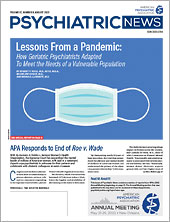APA Joins Coalition in Support of NIH Clinical Trial Diversity Act
In a
letter, APA and 21 other health organizations urged leaders of the House Energy and Commerce Committee to enact policies to improve clinical trial diversity among research funded by the National Institutes of Health (NIH). The organizations specifically expressed their support for the
NIH Clinical Trial Diversity Act (HR 7845), introduced by Reps. Robin Kelly (D-Ill.), Brian Fitzpatrick (R-Pa.), Tony Cárdenas (D-Calif.), G. K. Butterfield (D-N.C.), and Yvette Clarke (D-N.Y.).
The letter was addressed to Committee Chair Frank Pallone (D-N.J.) and Ranking Member Cathy McMorris Rodgers (R-Wash.), as well as the chair of the committee’s Subcommittee on Heath, Anna Eshoo (D-Calif.), and Ranking Member Brett Guthrie (R-Ky.). In addition to APA, signatories included the AMA and the American College of Physicians.
The NIH Clinical Trial Diversity Act “builds upon NIH’s current policies to enhance the inclusion of women, racially and ethnically diverse populations, and individuals across the lifespan in all NIH funded clinical trials,” the letter stated. The bill would provide a framework for NIH to work with researchers who are seeking to conduct a clinical trial to ensure that diversity goals are met.
“As is, current medical research does not take into consideration the efficacy of new technologies across different age, sex, and racial and ethnic groups,” the letter stated. “We must take steps to hold clinical trial sponsors accountable and support their efforts to ensure that clinical trials include diverse participants who are reflective of the populations that are most impacted by specific diseases and conditions.”
House Passes Restoring Hope for Mental Health and Well-Being Act
The release continued: “The legislation will help address record levels of overdose and suicide deaths, the child and adolescent mental health crisis, and the adverse psychological effects of the COVID-19 pandemic on Americans.”
Some of APA’s priority provisions in the package include the following:
•
Eliminating the option for non-federal governmental health plans to opt out of the federal parity law and providing funding for state insurance departments to enforce and ensure compliance with the mental health parity law.
•
Supporting uptake of the evidence-based Collaborative Care Model via grants to primary care practices to better integrate mental health care into primary care settings.
•
Directing funding through the Substance Abuse and Mental Health Services Administration (SAMHSA) for the 988 Suicide and Crisis Lifeline implementation and supporting state implementation of 988 through technical assistance and coordination.
•
Making crucial investments in the behavioral health care workforce by reauthorizing and increasing authorized funding for SAMHSA’s Minority Fellowship Program.
APA will continue to advocate for the legislation as it moves through the Senate.
APA Comments on Proposed Rule on Inpatient Facility Quality Reporting Program
In early April, the Centers for Medicare & Medicaid Services (CMS) released a proposed rule regarding 2023 policies for the Inpatient Psychiatric Facility Quality Reporting program.
The proposed rule would update the prospective payment rates and the wage index for Medicare inpatient hospital services, among other changes.
APA submitted comments on the rule, expressing its support for positive payment updates and providing input on future payment methodologies and billing policies. “[W]e encourage CMS to take a broader view across the full continuum of care and support funding for all levels of care including residential care, partial hospitalization, intensive outpatient services, and crisis services,” APA stated.
Additionally, APA provided feedback on a CMS Request for Information regarding approaches to collection of data on social disparities of health.
APA Expresses Concerns About Lack of Parity Enforcement
In the letter, signed by APA CEO and Medical Director Saul Levin, M.D., M.P.A., APA cited the recent DOL report to Congress, which found numerous parity violations potentially affecting millions of beneficiaries. “Psychiatrists want to serve and help patients,” the letter stated. “They want to join insurance networks and ensure that insured people, regardless of income, will have access to quality care for [mental and substance use disorders]. Administrative practices of insurance networks—all of which violate MHPAEA—preclude them from doing so.”
APA also encouraged the Centers for Medicare & Medicaid Services to support funding for all levels of care including residential care, partial hospitalization, intensive outpatient services, and crisis services. The letter also includes quotes from APA members who shared their own experiences with the challenges they face joining and staying with health plan networks. “I am a child psychiatrist who would love to accept commercial insurance and see the children of working people,” one member said. “The administrative burden, risk of inappropriate audit/financial loss, and laughable reimbursement rates make it impossible to take this risk as my family’s primary breadwinner.” ■
